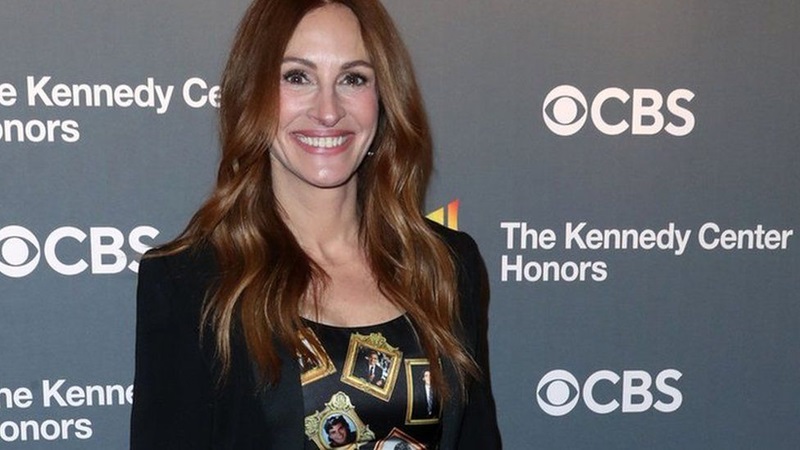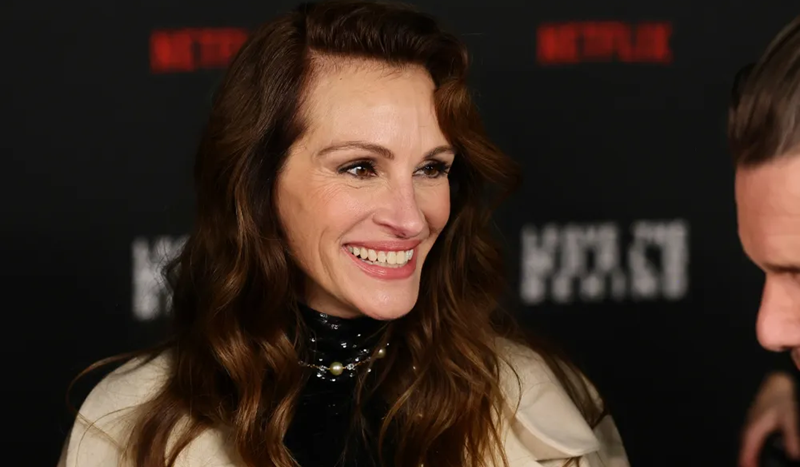In a recent interview, Hollywood actress Julia Roberts revealed that she has made a conscious decision to steer clear of nude scenes in her film career. The decision comes as a surprise to many fans, as Roberts has been known for her daring and bold performances in the past. However, the actress explained that she feels more comfortable and empowered by choosing to keep her body private on screen.
Roberts emphasized that this choice is not about succumbing to societal pressures or conforming to a certain standard of beauty, but rather about asserting her own agency and control over her body and image. She expressed that she wants to focus on her craft and the story she is telling, rather than relying on nudity to create shock value or attract attention. Roberts’ decision is a refreshing reminder that actresses have the power to set boundaries and make choices that align with their own values and beliefs, rather than succumbing to industry norms or expectations. It is a bold and empowering move that sets an example for other actresses in the industry to prioritize their own comfort and agency in their work.
Personal Decision and Public Statement
Personal decisions are choices that individuals make based on their own beliefs, values, and priorities. These decisions can range from what career path to pursue, who to marry, where to live, and how to spend one’s time and resources. While personal decisions are often made in private, there are times when individuals may feel compelled to make a public statement about their choices.
This could be due to societal pressure, the need to clarify misunderstandings, or to seek support from others. Making a public statement about a personal decision can be a daunting task, as it opens the individual up to scrutiny and judgment from others. However, it can also be empowering and liberating to speak one’s truth and stand by one’s choices.
In some cases, making a public statement about a personal decision can lead to positive change and inspire others to do the same. Ultimately, the decision to make a public statement about a personal decision is a deeply personal one, influenced by a myriad of factors including individual values, goals, and beliefs. It is important for individuals to consider the potential consequences of sharing their personal decisions with the public, and to weigh the benefits and risks before making such a bold move.

Impact on Her Career
The impact on her career was significant, to say the least. The allegations brought against her tarnished her reputation and credibility in the industry. Her once promising career trajectory took a nosedive as she faced backlash and scrutiny from colleagues and the public alike. The negative attention surrounding the situation overshadowed any previous accomplishments or successes she had achieved in her field.
Opportunities for advancement and growth became scarce as potential employers hesitated to associate themselves with someone who had been embroiled in such controversy. The stain on her professional record seemed to follow her wherever she went, hindering her ability to move forward and make a fresh start. The damage done to her career was not easily repairable, as the fallout from the allegations continued to haunt her long after the initial incident had occurred.
Despite her best efforts to distance herself from the situation and prove her worth, the shadow of doubt lingered, casting a dark cloud over her future prospects. In the end, the impact on her career was undeniable, serving as a cautionary tale for others in her industry to tread carefully and avoid any actions that could jeopardize their professional standing.
Influence on Industry Trends
Influence on industry trends is a complex and multifaceted phenomenon that can be driven by a variety of factors. From technological advancements to changing consumer preferences, there are many forces at play that can shape the direction of an industry. Companies must constantly monitor these influences in order to stay ahead of the curve and remain competitive in the market. For example, the rise of social media and e-commerce has revolutionized the way businesses interact with customers and sell their products.
This shift has forced many traditional retailers to adapt their business models in order to survive in an increasingly digital world. Additionally, environmental concerns and sustainability initiatives have also had a significant impact on industry trends, with many companies implementing greener practices in response to consumer demand for more eco-friendly products. Overall, the ability to anticipate and respond to these influences is crucial for businesses looking to stay relevant and successful in today’s rapidly evolving marketplace. By staying informed and adaptable, companies can position themselves to thrive in an ever-changing industry landscape.

Comparisons with Other Actors
When it comes to comparing actors with other actors, there are a variety of factors to consider. One important aspect to examine is the level of skill and talent each actor possesses. Some actors may have a natural ability to captivate an audience with their performances, while others may need to work harder to perfect their craft. Additionally, the range of roles an actor has taken on can be a key factor in comparing them to their peers. Some actors may excel in a specific genre or type of role, while others may showcase their versatility by tackling a wide range of characters.
Another important consideration is the level of recognition and acclaim an actor has received for their work. Awards, critical praise, and box office success can all be indicators of an actor’s impact and influence in the industry. Ultimately, comparing actors with other actors is a subjective process that can vary depending on personal preferences, tastes, and opinions. Each actor brings a unique perspective and style to their performances, making it challenging to make definitive comparisons. However, by examining their skills, range, and achievements, it is possible to gain a better understanding of the contributions each actor has made to the world of entertainment.

Supporting and Advocating for Change
Supporting and advocating for change is an essential part of driving progress and creating a more equitable society. By standing up for marginalized communities and challenging systems of oppression, individuals can work towards creating a more just and inclusive world. Advocating for change involves amplifying the voices of those who are often ignored or silenced, and pushing for policies and practices that promote equality and justice. It requires a commitment to challenging the status quo and pushing back against harmful norms and beliefs that perpetuate discrimination and inequality.
Whether it’s advocating for more resources for underserved communities, pushing for greater representation in decision-making spaces, or challenging discriminatory practices, supporting change requires courage, perseverance, and a willingness to confront uncomfortable truths. It also involves building alliances, mobilizing resources, and engaging in collective action to effect meaningful change.
Ultimately, supporting and advocating for change is about creating a more just and equitable society where everyone has the opportunity to thrive and live with dignity and respect. It is a constant process of learning, growing, and evolving, and requires a commitment to ongoing education, self-reflection, and action. By coming together to advocate for change, individuals can work towards creating a more inclusive and equitable society for all.
